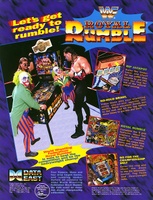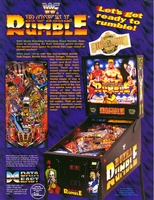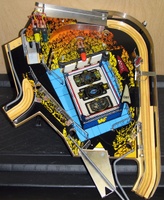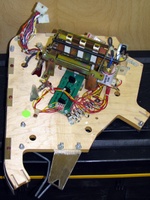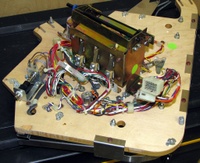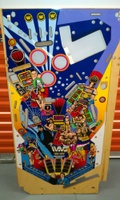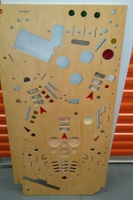
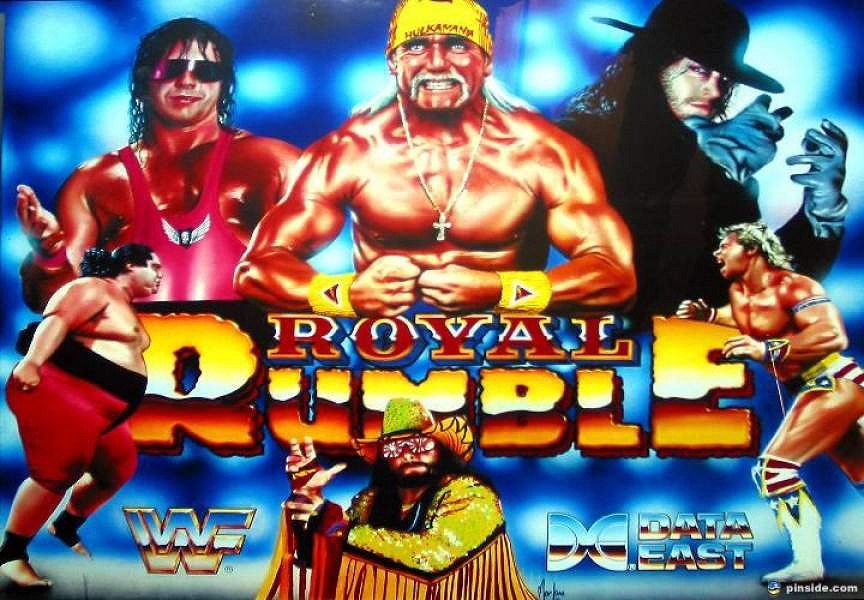
WWF Royal Rumble
First prototype game was a narrow-body game. Game kept changing as wrestlers left WWF for other organizations. Many custom voice samples from wrestlers. Included in this listing are pictures of an Early Production game. The apparent differences from later production games are itemized below, and seem to be evident in the flyer: 1) The plastic above the ramp in the upper left playfield indicates 'Lite Mode Start' instead of 'Banzai'. 2) The wide plastic along the back wall of the playfield does not have the yellow banner indicating 'Let's Rumble'. 3) The mini-playfield has the text 'Increase Jackpot' on the wood above a red insert instead of having the words 'Multi Ball' appearing directly on the red insert. This Early Production example has mylar that was rough-cut. If this mylar was really hand-cut at the factory, it could indicate this machine was a prototype of sorts. Its serial number was not obtained to assist in identification. This machine has French coin chutes possibly pointing to its first export destination. Also pictured in this listing is a game identified by Orin Day as a Test Game, having the Early Production plastics as listed above and also having three large round magnets in the lower playfield area that were to activate during multiball. The playfield was missing a bank of standup targets and three screw holes underneath showed the targets were once there but had been removed, with wires clipped, and aligned with the vacant hole were six factory dimples, each highlighted with a red marker pen. When we first showed the pictures to Orin, we asked him if this was an Early Production game and, if so, why were the magnets removed during production? He replied:My recollection is that early WWF games did have the magnets, like many DE games of that era. I know we removed them, pretty sure the reason was that they gave little bang for the buck in the game, especially with there already being a powerful shaker motor on board. Looking at those pictures the red Sharpie by the missing stand-up targets makes me suspect that this was a test game, one of the first five or six made, but that's just a hunch. I am pretty sure that the magnet code was present in the CPU software but I don't have the game code or display code to check for sure. And silly me, I don't own a WWF. :) I agree that the plastic changes indicate that it was at least one of the first 100 games. Quite often our earliest test games had "homemade" lettering on some ramp signs, but they were usually updated when they came back to our shop. My recollection also is that due to some weird Japanese import law we had to have the same number of magnets and motors in every game for that year, so Japanese games might have had the magnets somewhere (maybe not on the playfield, but at least in the cabinet - they didn't care about game features or not, just the total count). We could know for sure [that this is a Test Game] if we could see the manufacture date on the back of the backbox or cabinet, there is usually a dated sticker. Though sometimes those test games would come back, sit for a while, and then get a sticker with a date later than the production run! That would also be a dead giveaway. If Orin's second recollection is correct, then there may be games that had exported to Japan with uninstalled magnets packed inside the cabinet even if there was no easy way to subsequently wire them to the finished playfield or to activate any nascent software coding for them, if the coding was not already excised before exportation. We assume the playfield underside would have had the large round cut-outs for these magnets, like the example shown in this listing of a blank playfield that has them. Research would be needed to investigate these assumptions. Separate from the Test Game, Orin also commented on the prototype translite and prototype cabinet, shown in this listing courtesy of the PinGame Journal:These are pictures of a true prototype cabinet and backglass artwork. That first whitewood game was a narrow-body pinball but all the wrestlers were steroid-inflated widebodies. Some steroid scandal hit and WWF made DE redo the artwork so the wrestlers were more sleek, while in the meantime we decided the market needed more widebody pinballs. There was line art done for the narrow body playfield but there was never a screened playfield, just a whitewood, and I don't think it was ever actually built up and playable. We previously listed the Manufacture Date as May, 1994. This game was produced from Apr-11-1994 to Jun-17-1994.
